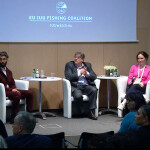The World Wildlife Fund has expressed concern over a recent decision by the Inter-American Tropical Tuna Commission (IATTC) against lowering catch limits on Pacific bluefin tuna.
At its meeting from 12 to 14 October in La Jolla, California, U.S.A., the IATTC, which is composed of members Belize, Canada, China, Colombia, Costa Rica, Ecuador, El Salvador, European Union, France, Guatemala, Japan, Kiribati, Korea, Mexico, Nicaragua, Panama, Peru, Chinese Taipei, United States, Vanuatu and Venezuela, took steps to address the rebuilding of Pacific bluefin tuna stocks but the WWF criticized them as “insufficient.”
“The scientific staff of the IATTC recommended an 87-day purse seine closure to account for the increase in fleet capacity and we are now in a situation where even the previous, weaker, conservation measure of 62 days has not been approved for the 2017 fishing season,” Fishery Director for WWF Ecuador Pablo Guerrero said. “That means there will be no conservation measures for tropical tunas at the beginning of the upcoming fishing season to protect these heavily fished species, unless countries find an agreement in a meeting that will be held in early February to discuss this matter again. Our market partners and other members of the sustainable seafood movement are likely to share concerns about this serious setback.”
Guerrero said WWF will push for a suspension of the Pacific bluefin commercial fishery if the IATTC does not take more substantive action at its December meeting.
“We must focus our attention on the Western and Central Pacific Fisheries Commission as it meets this December. If the governments that make up these management bodies continue to fail to agree on a rigorous Pacific-wide rebuilding and management plan, we believe the only way to end overfishing and to provide adequate hope for a future recovery of the stock is suspending the commercial fisheries of the Pacific bluefin tuna,” Guerrero said.
WWF also criticized the commission’s inaction on the adoption of safety improvements for fishery observers, who the organization says are “vulnerable to assault, obstruction, and intimidation while on vessels at sea."
Several fishing observers have died while working in the Pacific in the past year.
WWF has called on the IATTC and national observer programs to develop emergency action plans, as well as equip observers with a satellite communication device and waterproof lifesaving beacon during each trip.
“This is a matter of survival for the 500 observers working on board tuna vessels in the eastern Pacific,” Guerrero said. “The authorities in charge of observer programs have seemingly abandoned their responsibility to ensure that these workers operate in a safe environment with the tools necessary to maintain that on-the-job security. We cannot afford risking another tragedy before governments summon the courage to take action.”






